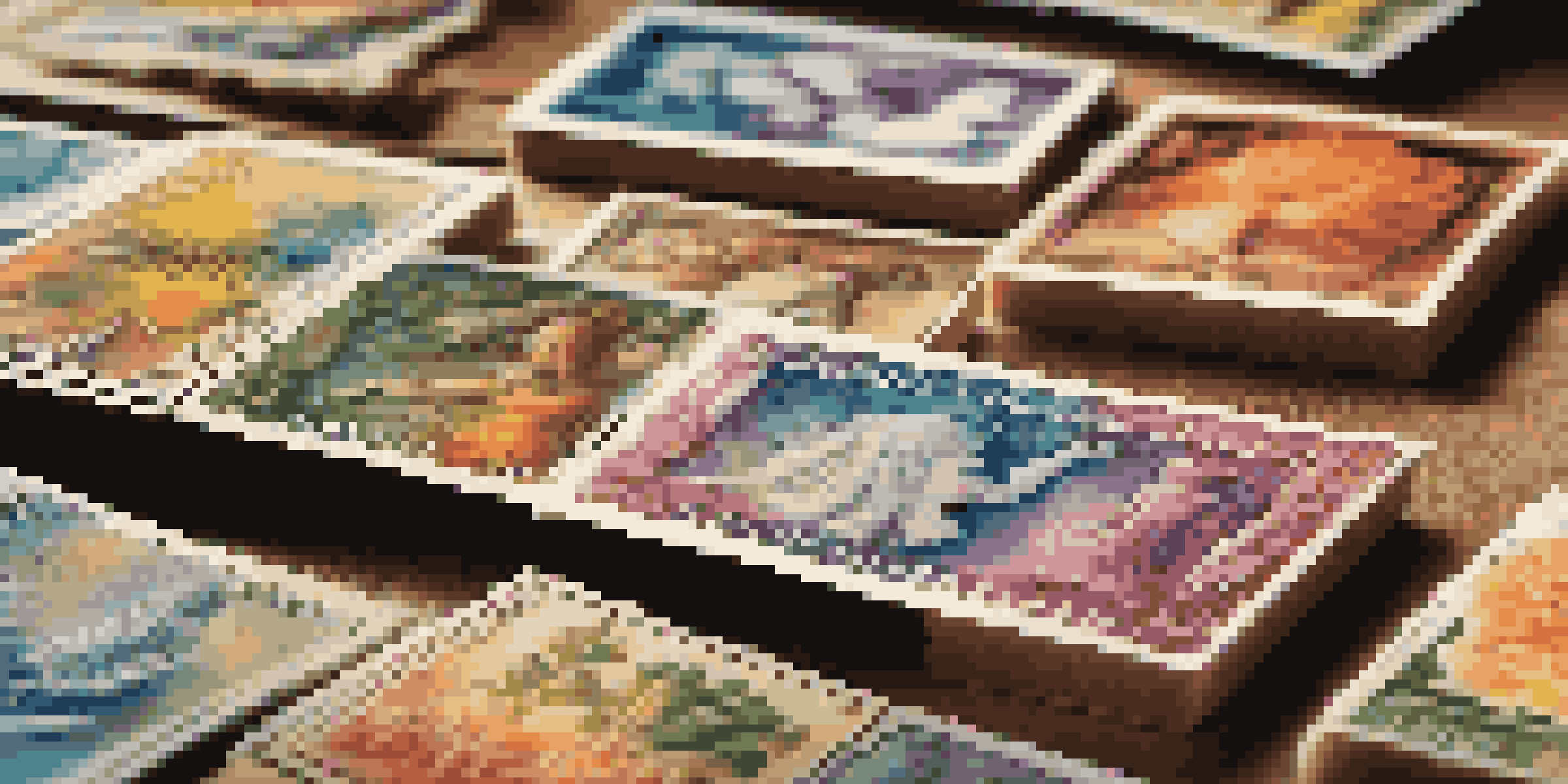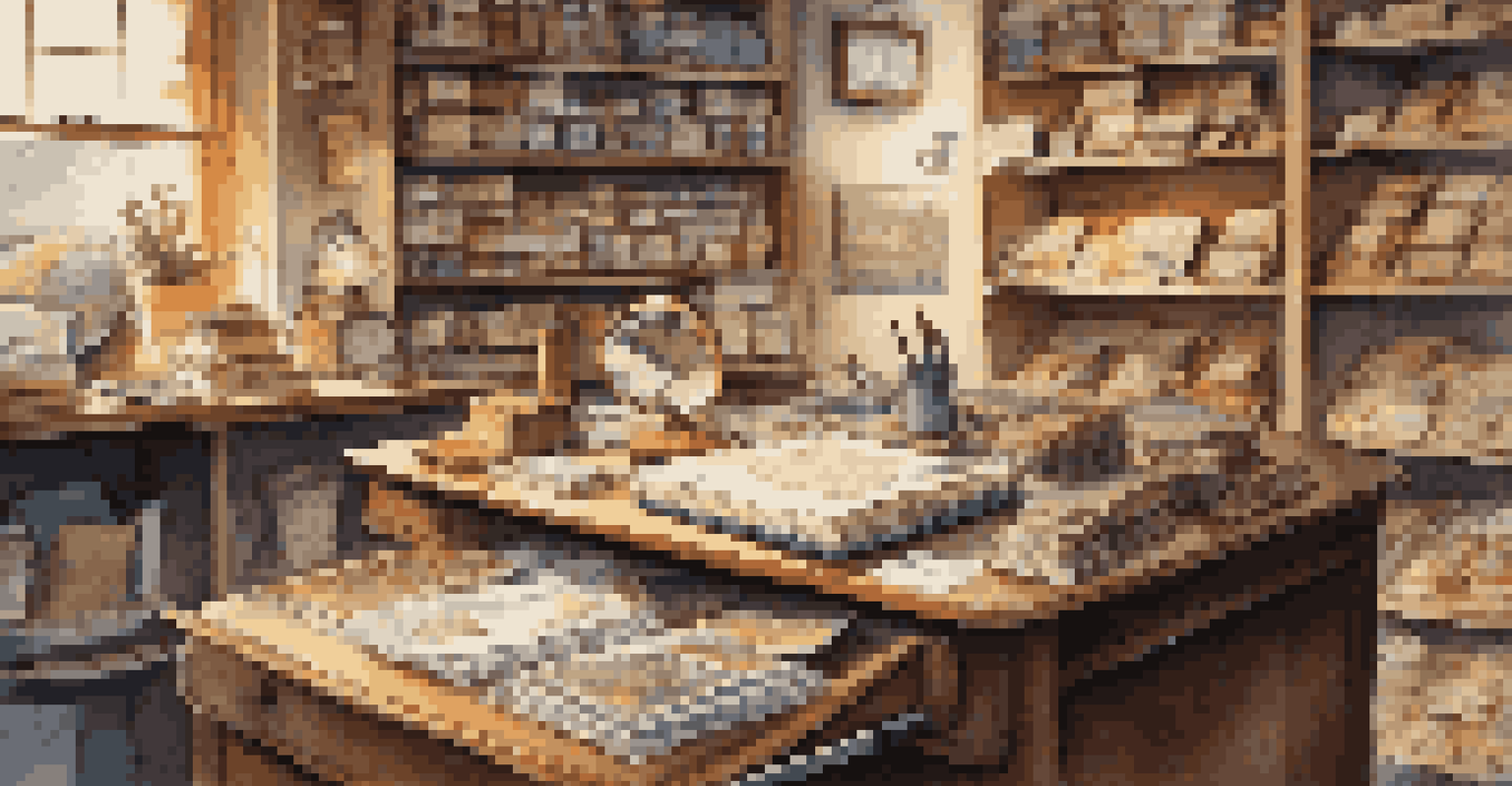The Psychology of Collecting: Why We Gather Stamps

The Allure of Collecting: A Deep-Seated Human Instinct
Collecting is a fundamental aspect of human nature, deeply rooted in our desire to create order and find meaning. From childhood, many of us gather items, whether it's toys or stickers, and this behavior often evolves into more focused collections as we age. Stamp collecting, in particular, offers a unique blend of history, art, and nostalgia, making it an appealing hobby for many.
Collecting is the delight of the eye and the pleasure of the mind.
The act of collecting can be seen as a way to connect with the past. Each stamp tells a story, representing a time, place, or event that collectors find intriguing. For many, gathering stamps is not just about the items themselves; it’s about preserving memories and experiencing a sense of continuity in an ever-changing world.
Additionally, collecting provides a sense of achievement and satisfaction. Completing a set or acquiring a rare stamp can evoke feelings of pride and fulfillment, reinforcing the emotional rewards that come with the hobby. It's this combination of historical connection and personal achievement that captivates many stamp collectors.
The Emotional Connection: Why Stamps Matter
Stamps often evoke emotional responses because they are tied to personal memories and experiences. A collector might have fond memories of a family member who was also a stamp enthusiast, creating a sentimental link to the hobby. This emotional connection can deepen the collector's engagement and commitment to their collection.

Furthermore, the aesthetic appeal of stamps cannot be overlooked. Many stamps are miniature works of art, showcasing intricate designs and vibrant colors. This beauty can spark joy and admiration, leading collectors to appreciate the artistry involved in stamp design, thus heightening their emotional investment in the collection.
Collecting Fosters Emotional Bonds
Stamp collecting creates deep emotional connections through personal memories and the stories each stamp tells.
The stories that stamps represent also play a significant role in their emotional value. Each stamp is a window into the culture, history, and geography of its origin, allowing collectors to feel a connection to different parts of the world. This narrative aspect transforms stamp collecting into a journey of exploration and discovery.
Community and Belonging: The Social Aspect of Collecting
Stamp collecting often fosters a sense of community among enthusiasts. Collectors regularly join clubs, attend exhibitions, and participate in online forums to share their passion. This interaction creates a supportive network where collectors can exchange knowledge, tips, and even stamps, reinforcing their love for the hobby.
The things we collect tell stories about who we are.
Belonging to a community also provides validation and recognition for collectors. Sharing their collections and achievements with like-minded individuals can enhance their enjoyment and motivate them to pursue their interests further. This social aspect can be particularly rewarding, as it transforms a solitary hobby into a shared experience.
Moreover, engaging with others in the collecting community can lead to lasting friendships. Collectors often bond over their shared interests, creating connections that extend beyond stamps. These relationships can enrich the hobby, making it a more fulfilling and enjoyable endeavor.
The Thrill of the Hunt: Collecting as a Challenge
One of the most exciting aspects of stamp collecting is the thrill of the hunt. The search for rare or specific stamps can evoke a sense of adventure, akin to a treasure hunt. This pursuit keeps collectors engaged, as they explore various avenues—be it flea markets, online auctions, or stamp shows—to find elusive pieces for their collections.
The challenge of completing a collection can also be a motivating factor. The satisfaction that comes from acquiring a hard-to-find stamp can be exhilarating, providing a rush that reinforces the collector's passion. This sense of challenge keeps the hobby fresh and exciting, as there is always something new to discover.
Community Enhances Collecting Joy
Engaging with fellow collectors fosters a sense of community, providing validation and enriching the overall experience.
Finally, the hunt for stamps often leads to learning opportunities. As collectors research and seek out new additions, they gain knowledge about different cultures, history, and the art of stamp production. This continuous learning process enriches the collecting experience and makes it all the more rewarding.
Investment and Value: The Financial Side of Collecting
For some collectors, stamp collecting is not just a hobby but also an investment. Certain stamps can appreciate significantly in value over time, making them a financial asset. Collectors often seek rare stamps, understanding that their rarity can lead to valuable returns, which adds an exciting layer to the hobby.
However, investing in stamps requires knowledge and careful consideration. Understanding the market, recognizing valuable stamps, and knowing how to maintain their condition are crucial for collectors looking to profit. This financial aspect can transform the way collectors approach their hobby, blending passion with strategic investment.
While many collectors enjoy the potential financial benefits, it's essential to remember that the true value of collecting often lies in the joy and satisfaction it brings. Even if a stamp doesn’t appreciate in value, the memories and experiences gained from collecting can be priceless.
Nostalgia and Memory: The Role of Remembrance in Collecting
Nostalgia plays a significant role in why people collect stamps. Many collectors are drawn to stamps from their childhood or stamps that represent significant historical events. This connection to the past not only fuels their passion but also allows them to relive fond memories through their collections.
Collecting can serve as a form of escapism, providing a way to step back into a simpler time. As collectors sift through their stamps, they often recall stories associated with specific pieces, creating a rich tapestry of memories linked to their collection. This reminiscing can be incredibly comforting, especially during challenging times.
Collecting as Lifelong Growth
Stamp collecting evolves with the individual, promoting personal growth and self-discovery through its challenges and rewards.
Ultimately, stamps serve as tangible reminders of our life experiences and the world around us. They encapsulate moments in history, allowing collectors to connect with their own stories while appreciating the broader narratives of society. This connection to memory adds a profound depth to the collecting experience.
The Lifelong Journey: Collecting as a Personal Growth Experience
Stamp collecting is often a lifelong journey that evolves with the collector. As individuals grow and change, so do their interests and the focus of their collections. This adaptability allows collectors to continuously find new joy and fulfillment in their hobby, making it an enriching lifelong pursuit.
Through collecting, individuals often develop valuable skills such as patience, organization, and research. The process of cataloging and caring for their stamps requires attention to detail and a commitment to preserving their collection. These skills can translate into other areas of life, contributing to personal growth.

Moreover, the act of collecting can foster a sense of identity. As collectors immerse themselves in their hobby, they often discover more about their interests and passions. This self-discovery can lead to a deeper understanding of themselves and their place in the world, making stamp collecting not just a hobby, but a meaningful part of their life journey.